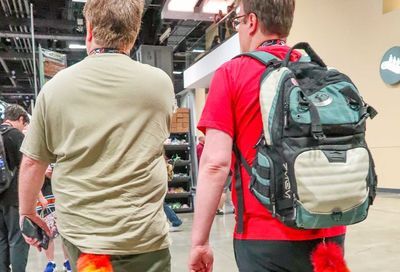Last minute break
Gay masseur in Manassas, VA gets special use permit to operate home business
The answer was in his wallet all along.
And when Howard Daniel stumbled upon on the business card of Steven S. Smith in November 2006, he remembered who Smith was, but couldn’t figure out what the Republican Manassas City Council member’s card was doing in his wallet.
One month before the find, Daniel had known Smith as one of three council members who voted against his application to operate a massage-therapy business from his home. This created a tie vote that was broken by Manassas Mayor Douglas S. Waldron, denying Daniel, who is African-American and gay, the special use permit necessary to operate a home-based business in the city.
Council members cited neighbor concerns of increasing traffic, among other reasons, but Daniel and his supporters, including the American Civil Liberties Union (ACLU), suspected that the opposition was motivated by his sexual orientation.
Shortly after the decision, Daniel, a full-time data administrator and part-time masseur, said he would challenge the decision and even hinted at a discrimination lawsuit.
But he would soon find out that Smith should not have participated in the Oct. 23 voting process. Smith’s absence would have granted Daniel a special use permit on that date with a three to two vote (contingent on everyone else keeping the same votes). Investigating the route of Smith’s business card into Daniel’s wallet would prove that.
”I was [wondering] ‘how did I get this card?’. I didn’t understand where I got it from until I remembered his wife, Jane Oliver Smith,” he says. ”She handled my deed consolidation, and we had bumped into Steven Smith in her office.”
That chance encounter — the first time the two would meet — came before the October hearing that denied his permit.
Before Daniel could apply for a special use permit, he had to follow certain procedures regarding his property, and Smith’s law firm was involved in that process, which creates a conflict of interest because Daniel was paying Smith’s law firm for those services.
”At the time I did not make the connection at all,” Daniel says. ”We did exchange words and I did tell him that getting my [special use permit] was the reason I was there.”
David F. Olsky, Daniel’s current attorney, explains that the issue at the time involved how the city had recorded the deed for the land on which Daniel’s house was built. Daniel’s house stretches across two adjacent lots, most likely because the previous owner had bought a parcel of land adjacent to the original lot, built an extension to the house on top of the new parcel, without recording a new deed with Manassas to reflect the change.
Olsky says that the city code required that Daniel consolidate the two lots into one before applying for a special use permit. Which means that Daniel needed to draft a new deed for his house and have it recorded by the city.”[Daniel] did not have expertise in drafting and recording deeds, so he decided to hire a settlement company to do the work for him,” Olsky says.
”He was referred to Greenbrier Settlements LLC. The managing principal of Greenbrier Settlements is Jane Oliver Smith, the wife of Council Member Steve Smith. Unbeknownst to [Daniel], Greenbrier Settlements, LLC hired Smith Hudson & Carluzzo, P.C., Steve Smith’s law firm, to draft and record the deed. [Daniel] did not receive a copy of the deed — which revealed in fine print that it had been prepared by Smith Hudson & Carluzzo P.C. — until after the city council vote.”
Olsky presented the evidence to the council and concluded that Smith should not have participated in the first vote.
”Steve Smith should have recused himself from the initial vote because his law firm, without [Daniel]’s knowledge, performed a legal service on [Daniel]’s behalf in furtherance of [Daniel]’s application — the drafting and recording of the consolidated deed for [Daniel]’s house,” Olsky says.
”[Daniel] was a client of the firm, and thus was also a client of Council Member Smith,” creating a conflict of interest, Olsky adds.
Smith did not return calls seeking comment by Metro Weekly deadline.
The council re-voted on Daniel’s application, without Smith, on Monday, Feb. 12, and approved his application. Daniel says he feels that the absence of former Republican council member Jackson Miller, who in November was elected as a state delegate, worked in his favor.
”That only left the ‘no’ vote of [Republican] Marc T. Aveni, and the mayor did not have to vote, because there was no tie.”
Daniel can now operate his massage-therapy business from his home, thanks in part to keeping Smith’s card in his wallet after their initial encounter.
”The arguments plainly showed how much of the case was being handled very differently than other businesses cases,” he says. ”But finding the card was definitely one of the powerful aspects to have the opportunity to have the vote reversed.”
Support Metro Weekly’s Journalism
These are challenging times for news organizations. And yet it’s crucial we stay active and provide vital resources and information to both our local readers and the world. So won’t you please take a moment and consider supporting Metro Weekly with a membership? For as little as $5 a month, you can help ensure Metro Weekly magazine and MetroWeekly.com remain free, viable resources as we provide the best, most diverse, culturally-resonant LGBTQ coverage in both the D.C. region and around the world. Memberships come with exclusive perks and discounts, your own personal digital delivery of each week’s magazine (and an archive), access to our Member's Lounge when it launches this fall, and exclusive members-only items like Metro Weekly Membership Mugs and Tote Bags! Check out all our membership levels here and please join us today!



















